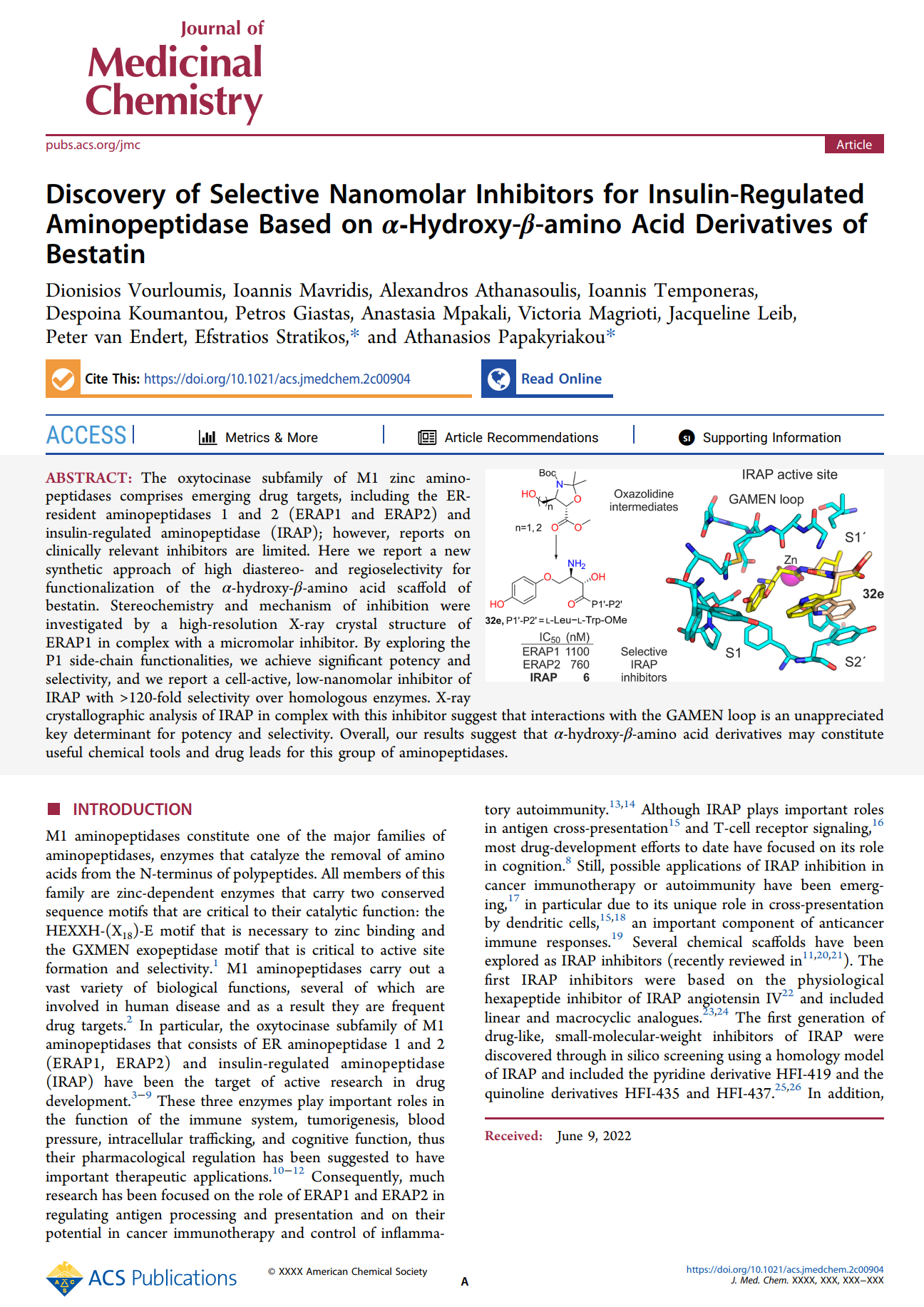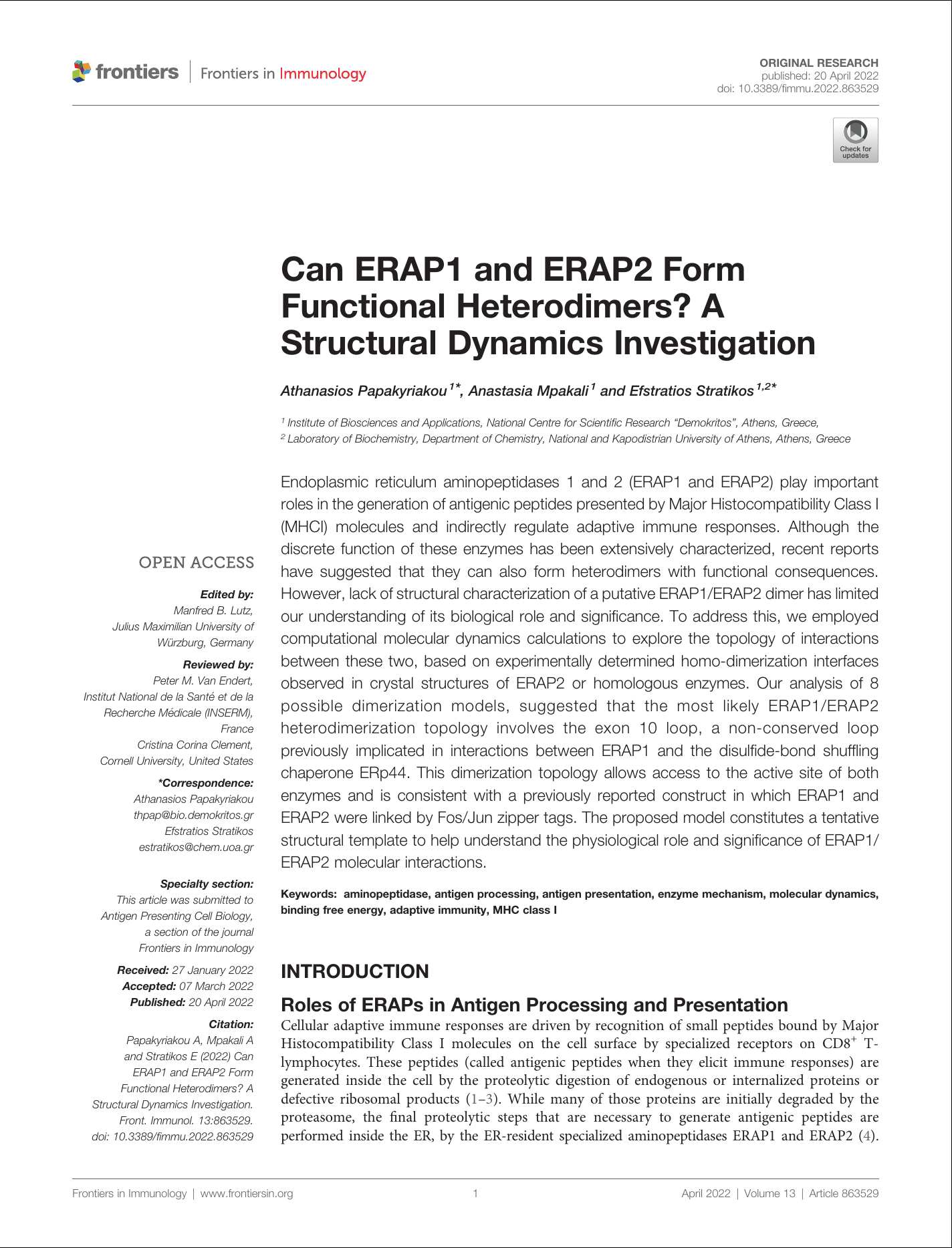Designed Biomolecules
Research Group
Structure-based design & synthesis of bioactive molecules
Computational study of biomolecular structure & dynamics
ARIA: “Atomic Resolution Insight into the Antigen processing machinery”
Implementation: Oct 2018 – Apr 2022
Budget: € 180,000
Project No. 303
Atomic Resolution Insight into the Antigen processing machinery "ARIA"
ARIA aims to elucidate key antigen processing mechanisms of the adaptive immune system at the molecular level of detail in the highly complex cellular environment.
Major histocompatibility complex class I molecules (MHC-I) is a key module of adaptive immunity, the cell’s arsenal against infectious pathogens and malignant transformations. MHC-I present antigenic peptides to cytotoxic T lymphocytes at the cell surface, which in turn unleash their cytotoxic apparatus only when peptides from non-healthy proteins are recognized. This process is the result of an equally important peptide processing function performed by two endoplasmic reticulum (ER) resident aminopeptidases, ERAP1 and ERAP2.
Key mechanisms of antigen processing have not been clearly understood in spite of their fundamental role in vaccination. Profound understanding of the exact mechanisms of peptide trimming by ERAP1 and ERAP2 in the context of MHC-I will enhance immunoprotective epitopes prediction in infections and cancer. This will in turn pave the way for the development of more effective T cell-targeting vaccines and biomarkers to stratify patients’ suitability for immunotherapy.
ARIA will employ a sophisticated, interdisciplinary approach that integrates computational modelling of key molecular mechanisms using state-of-the-art molecular dynamics simulations and free energy calculations in conjunction with biochemical investigations and X-ray crystallographic analysis of protein-protein complexes.
The proposed research will be carried out by two independent, yet highly interconnected, interdisciplinary groups led by researchers who have long experience in structural and biophysical studies in the field. A world leading group at the host institute and the collaborating group in Oxford (UK) will also support the fruitful implementation of the project.
Publications related to ARIA
Discovery of Selective Nanomolar Inhibitors for Insulin-Regulated Aminopeptidase Based on α-Hydroxy-β-amino Acid Derivatives of Bestatin
Vourloumis, D., Mavridis, I. Athanasoulis, A., Temponeras, I., Koumantou, D., Giastas, P., Mpakali, A., Magrioti, V., Leib, J., van Endert, P., Stratikos*, E., and Papakyriakou, A.*
Journal of Medicinal Chemistry 2022, doi: 10.1021/acs.jmedchem.2c00904
The ERAP1 active site cannot
productively access the N‑terminus
of antigenic peptide precursors
stably bound onto MHC class I
Mavridis G., Mpakali A., Zoidakis J.,Makridakis M., Vlahou A., Kaloumenou E., Ziotopoulou A.,Georgiadis D., Papakyriakou A. and Stratikos E.
Scientifc Reports, 2021, 11:16475. doi: 10.1038/s41598-021-95786-x
A systematic re-examination of processing of MHCI-bound antigenic peptide precursors by endoplasmic reticulum aminopeptidase 1
Mavridis G., Arya R., Domnick A., Zoidakis J., Makridakis M., Vlahou‖ A., Mpakali A., Lelis A., Georgiadis D., Tampé R., Papakyriakou A., Stern L.J. and Stratikos E.
The Journal of Biological Chemistry 2020, 295, 7193-7210
Watch a video illustrating the antigen presentation mechanism by the MHC-I molecules
https://www.formfinder.com/fileadmin/res/images/layout/index.html
https://acis.com.vn/wp-content/uploads/2018/10/page-4.html
http://dentydent.es/wp-content/uploads/2022/01/index.html
https://powerbankakku.de/images/2018/06/index.html
https://www.advizzo.com/wp-content/uploads/2023/03/page-2.html









